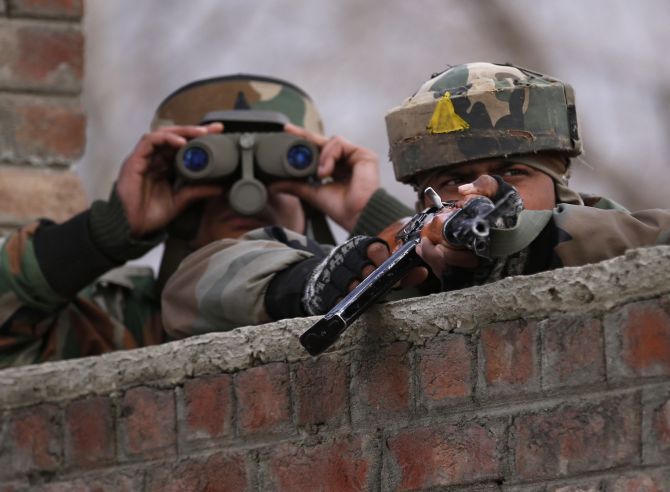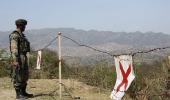 The 'surgical strikes' by India have made the army in Pakistan look unprepared.
The 'surgical strikes' by India have made the army in Pakistan look unprepared.
To prove itself the army will need to hit back: It could be in Kashmir or outside, says Aditi Phadnis.
India can't stop congratulating itself at the success it has had in isolating Pakistan as the vanguard of terror and everything evil.
At both BRICS and BIMSTEC (Bay of Bengal Initiative for Multi-Sectoral Technical and Economic Cooperation), India studiedly singled out its closest neighbour to ignore, freezing it with contempt, not even mentioning it by name.
The BIMSTEC meeting was structured and designed to invite everyone in the neighbourhood but Pakistan -- almost as though by pretending it isn't there, it will go away and take all its problems with it.
Ordinary Indians like filmmaker Anurag Kashyap are understandably angry. It was after Prime Minister Narendra Modi's visit to Lahore and his oh-so-friendly outreach to Nawaz Sharif's family that Karan Johar decided to make Ae Dil Hai Mushkil, starring Pakistani actors. And now, because we want the film to show in India, we are enemies of the nation, he is asking.
This begs the bigger question: India has been almost too successful in isolating Pakistan. So if there is another attack -- as there is bound to be -- given the nature of the relations -- what will Narendra Modi do? The people now expect a 64-inch chest.
Indian people are not the only ones confused. Things are no better across the border.
It could be a coincidence, of course. But isn't it odd that the Imran Khan-led Pakistan Tehreek-e-Insaf should choose to launch another agitation against Nawaz Sharif just days before Chief of Army Staff General Raheel Sharif is to relinquish office (November 28)?
In deference to elections to the Supreme Court Bar Association of Pakistan on October 30, the PTI has postponed till November 2 a sit-in over Nawaz Sharif and his family's wealth abroad as revealed in the Panama Papers.
The Panama Papers came to light months ago. So why the sit-in now?
That's not the only question. The 2,000-plus list of those in Pakistan who have maintained dealings with M/s Mossack Fonseca, has on it Nawaz Sharif's children and relatives of the two wives of Shahbaz Sharif (the chief minister of Punjab and Nawaz Sharif's brother).
But it also includes ex-prime minister Benazir Bhutto. Her nephew Hassan Ali Jaffery and former interior minister Rehman Malik are said to have co-owned Petrofine FZC. The family of Osman Saifullah, a senator for the PPP, has registered 34 offshore companies.
In delicious irony, Saifullah is a serving member on a body that is deliberating on Pakistan's tax reforms programme, such as it is. But these individuals are not the target of PTI's ire.
It is only Nawaz Sharif and his government.
The sit-in event itself is designed to paralyse life in Islamabad. It did so quite effectively the last time around when Khan and Pakistan Awami Tehreek chief Tahirul Qadri together set Pakistan's nerves jangling and reduced the government to a cowering, pitiful mess after a protest against the Pakistan Muslim League's electoral malpractices that shut Islamabad down for nearly six weeks.
At the time the chatter in Pakistan was that the army was using the two groups to settle its scores with the government.
This time too, Khan is staging a protest just before the COAS is due to retire. It is sure to make the government look ineffectual.
Khan is saying that he and his supporters will not budge from Islamabad until Nawaz Sharif comes clean on his family's hidden wealth. The siege could go on forever unless the army steps in.
General Raheel Sharif has said he does not want an extension and also that he does not want to become Field Marshal.
But there is no doubt that Uri and the 'surgical strikes' by India have made the army in Pakistan look gauche and unprepared.
To prove itself the army will need to hit back: It could be in Kashmir or outside.
Retaliation for the strikes is also imperative for domestic political reasons -- for it will give Raheel Sharif a chance to correct the balance that has suddenly tilted heavily in favour of the elected government.
In order to prevent that and ensure the army is kept at arm's length, Nawaz Sharif is reported to be considering replacing both the COAS and the Director General Inter Services Intelligence just to bring the forces down a peg or two.
The Pakistan daily Dawn told us how Prime Minister Sharif, at a meeting with the COAS, asked him to call off his dogs and berated him for his incompetence.
Although it was denied four times by the government, intelligence suggests the report is absolutely accurate.
The only question is how quiescent Nawaz Sharif was in the planning of the Uri attack and whether he distanced himself from it only when it went bad.
The prime minister's confidence stems from other sources as well. He is confident that he cannot be disturbed, barring active intervention by the army.
In the 342-member lower house of parliament, his party has 188 MPs. Even if the two Opposition parties -- the Pakistan Peoples Party (46) and the PTI (34) -- join hands, they cannot depose him.
Moreover, in the next general elections due May 2018, Sharif has a better chance of returning to power than the PPP, which is in a torpor.
In the circumstances, either the COAS goes quietly, accepting the ceremonial rank of Field Marshal or he decides to do a Musharraf with a little help from friends like PTI.
We have till November 30 to find out.
For India-Pakistan relations the next 30 or so days are going to be the most dangerous.
IMAGE: Soldiers at the site of a terror attack in Kashmir this year. Photograph: Danish Ismail/Reuters












 © 2025
© 2025